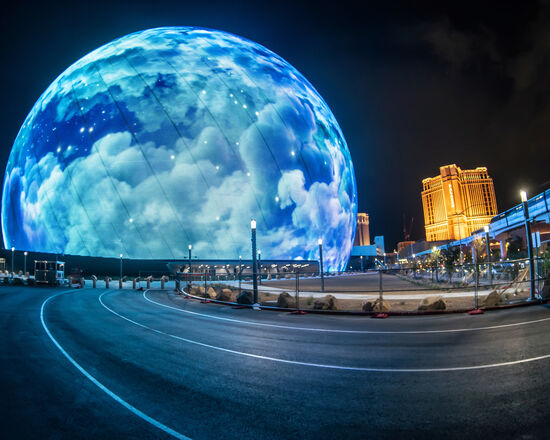A Noise Dispute Rocking Las Vegas: The Legal Battle Over the Sphere’s Sound Impact
Las Vegas is no stranger to high-energy entertainment and cutting-edge venues, but a lawsuit filed by James Kay and his limited liability company, Lost Wages LLC, has brought attention to an issue that is rarely in the spotlight: noise pollution. The legal action, which centers around the highly acclaimed Las Vegas Sphere and its state-of-the-art sound systems, raises broader questions about balancing urban development and the rights of local residents. With the Clark County District Court judge recently declining a motion to dismiss the case, the legal battle is set to continue, drawing significant public and legal interest.
At the heart of this dispute is the Exosphere, an innovative and technologically advanced entertainment venue that opened as part of the Las Vegas Sphere in July 2024. While the venue has been celebrated for its remarkable audio-visual experiences, Kay, a resident of Park Towers and president of Lucky’s Two-Way Radios Inc., claims the sound levels produced by its new sound system have become unbearable. According to his lawsuit, the excessive noise disrupts his daily life, rattles his windows, and diminishes his ability to enjoy his property.
The legal proceedings, initiated in October 2024, represent far more than just one resident’s grievances. The case has sparked a much wider conversation about noise pollution and urban planning in a city where large-scale entertainment spaces often operate in close proximity to residential communities. Kay’s lawsuit does not merely target the Las Vegas Sphere’s operators but also includes The Venetian resort and Clark County officials for approving a contentious sound permit.
The sound permit in question, approved in July 2024, allows the Sphere to exceed the standard county sound limit of 65 decibels up to 18 times per year. On these occasions, sound levels are permitted to reach up to 87 decibels—a full 22 decibels above the standard limit. This waiver was granted after a 3-1 vote by the Paradise Town Advisory Board, after operators of the Exosphere successfully argued that such elevated sound levels were essential to provide the immersive, high-quality experiences for which the venue is famous.
However, Kay and his legal team argue that these sound allowances come at the expense of neighboring residents. His lawsuit asks for damages exceeding $15,000, including general, special, compensatory, incidental, and punitive damages, along with coverage for legal fees. At its core, the legal battle is framed around property rights violations and the broader issue of how cities manage noise pollution in rapidly urbanizing areas.
In an effort to diffuse tensions, Sphere officials had previously agreed to a series of sound-related compromises. These included capping event sound levels at 85 decibels on waiver-permitted days, notifying nearby residents two weeks ahead of high-volume events, and ceasing sound production by 11:30 PM, except on New Year’s Eve, where the timeline would extend to 1 AM. Despite these concessions, Kay deemed the efforts insufficient and proceeded with his lawsuit.
The court’s recent decision to allow the case to move forward is a meaningful step, as it suggests Kay’s claims are credible enough to warrant a deeper examination by a judge or jury. This decision not only keeps the legal challenges alive but also sets the stage for broader discussions about how densely populated cities like Las Vegas can balance the interests of large-scale entertainment venues with those of local communities.
While the Las Vegas Sphere represents a leap forward in entertainment technology, it also highlights the challenges posed by such advancements. For nearby residents, the auditory spectacle translates into a disruption that impacts their quality of life. This tension exemplifies the struggle between urban innovation and the preservation of community well-being, a problem faced by cities all over the world.
The lawsuit also casts a spotlight on the accountability of local government. As the case unfolds, Clark County officials who approved the sound waiver will likely face questions about their decision-making processes and how they weighed the interests of businesses against those of residents. Legal experts and residents will undoubtedly monitor the proceedings to see how the court navigates the interplay of property rights, community expectations, and economic development.
Looking ahead, the implications of this case could be far-reaching. Potential outcomes may include stricter noise regulations, enhanced mitigation measures for large-scale venues, or financial restitution for affected residents. In a broader sense, the lawsuit serves as a reminder that urban innovation must involve thoughtful and inclusive planning to ensure the long-term harmony between businesses and the communities in which they operate.
Ultimately, this case represents a microcosm of the challenges that cities like Las Vegas will continue to face as they push the boundaries of entertainment and technology. Finding an equilibrium that respects both innovation and the sanctity of community life will require all stakeholders to work together toward sustainable solutions. Whatever the result, the outcome will surely influence the future of entertainment, urban planning, and residential relations in the City of Lights.
